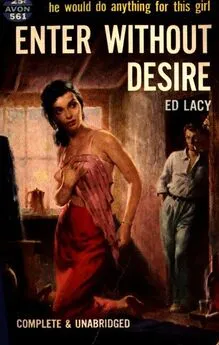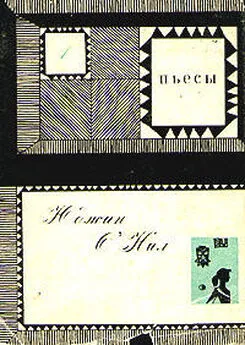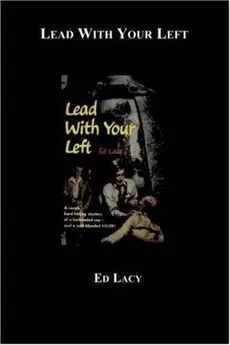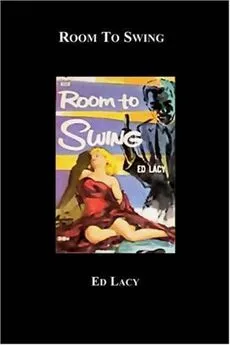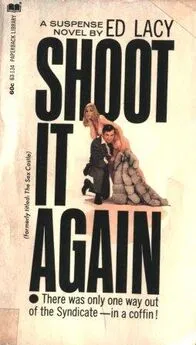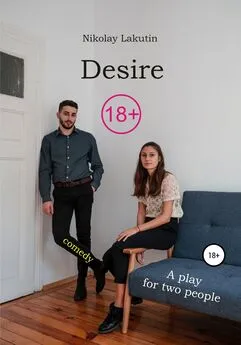Ed Lacy - Enter Without Desire
- Название:Enter Without Desire
- Автор:
- Жанр:
- Издательство:неизвестно
- Год:неизвестен
- ISBN:нет данных
- Рейтинг:
- Избранное:Добавить в избранное
-
Отзывы:
-
Ваша оценка:
Ed Lacy - Enter Without Desire краткое содержание
Enter Without Desire - читать онлайн бесплатно полную версию (весь текст целиком)
Интервал:
Закладка:
The job was ideal. Each evening, from six to nine, and half a day Sunday, I slipped on a white jacket, kept the water glasses on the tables filled. I picked up a few cents in tips. Best of all, I ate like a pig in the kitchen, stuffed myself with good food, plenty of meat.
By the time I was seventeen, I was still a runt but weighed 165 pounds, had walking beam shoulders that made me look even shorter than I was, and legs like tree trunks. There were write-ups in the paper about me, about the team winning the state title—which really didn't mean much in Kentucky. But it all helped the tips I pulled down in the restaurant.
In my senior year, Buster got a Dayton high-school job. I had scholarship feelers from two big southern schools, and a half dozen small, Midwestern colleges. When the team went up to Cincinnati, across the Ohio River, for a radio interview, I hitched my way on up to Dayton, told Buster about the offers.
He said, 'Marsh, you're too small to ever be a real football player. You got to have beef in this game. I was you, I'd forget college ball.”
“I didn't come to ask you that. Football has kept me out of the mill, now it will put me on a college gravy train, get me the hell out of that hick burg.”
Buster shrugged. “You've always been a cocky little bastard. Okay, but watch out you don't get hurt. College ball will be a lot different. Tell you, Marsh, take a small college. Grind won't be so rugged there.
It was a little school in Indiana that was out to build a stadium, make money. I got fifty bucks a month plus room and board for emptying the gym trash basket—often it would need emptying every month. I made another fifty waiting on table. I liked college. I not only had the prestige of being a “football man,” but more important I found out all the sketching I'd done as a kid wasn't outright junk. I decided to study advertising art, which was supposed to be a big money deal.
Buster was right about football—I was playing against bruisers averaging 210 pounds and I still couldn't tip the scales above 166. I was light and fast on my feet, still bounced around like a ball—only sometimes after a game I had to stay in bed all day. After the freshman year, I got the regular sub berth at left end. During the summer I wangled a scholarship at the Chicago Art Institute, and a job at a children's day camp that kept me in food.
I was finishing my soph year when they pulled the props from under me. We were playing a big university—a game we couldn't possibly win—but the university had a large stadium and “our” cut of the gate was big dough. They put me in the second quarter and I picked up yardage in two plays. We had one of these hidden ball deals where I ran to the right sideline, made like a bunny down the field, and cut in to receive the pigskin. Our back could rifle the ball like a bullet. As I cut in, I put my hands up in the air and the ball was there—as I knew it would be. Tucking the leather under my arm, I started making tracks. I was twenty yards from their goal and only a safety man ahead of me.
A week later, when I was still in the hospital, the coach showed me movies of the game. A brace of giants who ran like they were jet propelled got me from the rear. Some 437 pounds of brawn gave me a brain concussion, along with minor bruises.
I snapped out of the concussion without being paralyzed, but the docs warned me to be careful—mustn't fall or trip, watch myself going downstairs—“a misstep can give you an awful jar.” Any sudden fall, I could end up blind, or dead. They gave me a long lecture about staying out of fights and football games for the next few years—a clout on the jaw could leave me bedridden, if it didn't kill me. I finished out the term and in a way I was even a sort of campus hero... but of course my athletic scholarship wasn't renewed.
I hit New York with some good clothes, not many, but what I had was, and looked, expensive, and a little over a hundred bucks in my kick. I was twenty and confident I'd set the advertising world on its bottom. I got a cheap room on the outskirts of the village, practiced hard to get rid of my drawl, and anything that would make me sound like a hick. To be a “hick” seemed to my childish mind to be the greatest of horrors, and calling me a “hill-billy” was fighting words.
I was in love with New York. Broadway fascinated me, Fifth Avenue amazed me, Central Park was lovely country, and Coney Island the place for a mad night. I liked watching the smartly dressed women on the streets, the shops; the tension of many people in the air. I even enjoyed the constant rush, the great wasted energy of a city.
The phony, fairy atmosphere of the Village interested me, with the would-be “Bohemian” bars, the comic jokers who roamed the streets trying overhard to be characters. It was 1939 and I soon realized the Greenwich Village I'd read so much about had vanished a dozen years before.
Dressing my sharpest, I began making the rounds of the agencies with my sketches, then rushing back to my room to hang up my good shirt and change to an old one. But the ad business was glutted with eager kids like myself. Although I lived as cheaply as I could, my money didn't last three weeks. I found a job as a waiter in a large coffee pot, and on my off days still made the rounds of the agencies, getting a little punchy from the polite doors slammed in my face.
I hit this small agency one afternoon, one of these compact outfits with a few good accounts. The boss was a shorty like me, but gone soft and fat. His name was Barrett. His assistant was Marion Kimball and she was in the process of giving me the brush-off, the usual line about ”... although your work shows definite talent, at the moment we do not have any openings...” when she suddenly reached across the desk and felt of my arms. It was a muggy day and I only had on a thin sport shirt. Due to not eating regularly I was in fair shape. She said, “My God, real midget muscle man, aren't you? Stick around for a second.”
She called Barrett on the office phone. He came in and looked me over like he was a queer. Turning to Kimball he grunted, “He's the man.” Then he favored me with a grunt. “Thirty a week. Okay, son?”
“Yes, sir!” I said, my heart pounding. Thirty was low, even for a starter, but that didn't matter... I actually had a job as an artist!
“Miss Kimball will explain your duties,” Barrett said and left us.
Marion Kimball looked like she could be in her late twenties, middle thirties, or even older. She had a firm, hard figure, probably well girdled, and a shrewd and sophisticated face under a smart makeup job, and she was expensively and smartly dressed. A handsome woman, rather than pretty. She grinned and it was her teeth that told me she was older than she appeared. “Let me break this to you right, Jameson. I'll let you do some art work, whenever I can. But you're a rent collector.”
“A what?”
“My, my, aren't we shocked and angry.”
“Well damnit, I'm an artist and...”
“Get the wind back in your sails, Jameson. Take the job, artists are a nickel a dozen. Job is fairly easy. Barrett owns several houses, some of them tenements. He has a complex about being held up, and a mania about real estate agents screwing him. Also, he hasn't the time to look after the houses. You'll do that, and collect the rents. Be any trouble bonding you?”
“I don't think so.”
“Fine. The houses won't take up all your time, and I will try to give you some art work. Buying it?”
“Yeah,” I said, disappointed as the devil.
We shook hands. Kimball's hand hard and warm, almost intimate.
It wasn't a bad job. I had seven houses to “take care of.” Each day I'd leave my room at about ten, start making the rounds of the houses. There were two “good” houses on West 55th Street, former brownstones that had been converted into small, expensive apartments. There were large tenements on the lower West Side, where five rooms and hot water rented for $30, and one house in Harlem where five rooms without heat or hot water rented for $40.
At each house I'd chat with the janitor, pick up what rents he had, visit people who were behind and maybe send them to the relief office. I had the authority to okay small repairs, or even order a paint job. Around the first of the month I'd be busy, put in full days, but usually I was finished by one, would drop into the office and give Barrett a quick accounting—and the dough—then finish out the day behind my drawing board.
I soon wised up to some of the soft dough waiting to be picked up. It was real small time, but I could average an extra ten bucks a week. Barrett probably knew about these rackets, that's why he started me at thirty. For instance, I'd tell a janitor to buy a broom and pay him when he gave me the paid receipt from the hardware store... then I'd add a new pail or a couple of pounds, of soap powder on the receipt—pocket the buck or two.
As I said, it was petty scuffling.
When there was an apartment to be painted, I had a choice of several painters and by dropping a hint that I was interested in a Broadway show, I'd chisel a pair of orchestra seats now and then.
There were other angles that could be worked with the janitors. If a tenant moved in on the fifteenth of the month, I'd hold his rent till the first of the following month, tell Barrett he'd moved in as of the first. Then when he paid again on the fifteenth, I'd split this one “extra” rent with the janitor. As long as I remembered to make out the tenant's receipt dated the fifteenth, everything was okay. Sometimes, when I had a couple hundred bucks in rent money on me, I could even short-change Barrett out of a five spot.
If you think this was a petty hustle, remember the janitors had their own angles. But it wasn't hard work, my hours were my own, and I never got tough with anybody or looked for trouble.
Life moved smoothly. I moved to a room on East 37th Street, which wasn't much, but the address was “good.” I lived correctly, wore the correct brands of clothes and, by scrimping, I could even take a babe out to a correct bar now and then—vaguely mention I was “something in real estate,” or “something in advertising,” depending on what brand of bull I was dishing out. It was all a phony front, and I didn't like playing the four-flusher, but it was a way of life, and good for a few fast tumbles.
Of course, after a week or so I got hep to the office set-up. Kimball was the brains of the firm—she was everything. She could write copy, lay out ads, butter up accounts when necessary. She was extremely capable and efficient. She was never off guard or relaxed, was in there pitching all the time... yet there was a sort of sensuous warmth about her I could never figure out I could feel it in the way she'd glance at me now and then, like the promise of an expensive mistress. Like the glowing of a match before it bursts into flame. It was all in contrast to her cold, super-efficiency. I never kidded around or made a pass, but I often wondered what she'd do if I pinched her ass, fire me or pinch me back.
Kimball was always barking, full of razor-like sarcasm. Everyone was lashed by her biting voice, even Barrett... but I had the feeling he slept with her any time he wanted.
Barrett was easier to figure—he was all boss, knew only one way of doing things—to keep plugging. He dashed at each new account like a bulldog, bluntly hanging on till he either had the account or was completely knocked out. He worked hard, worried hard, had his ulcers and a soggy wife —whom I only saw once, and who probably only saw him once or twice a week, if that often.
Barrett would have gotten nowheres, except to a padded cell, without Kimball. She was behind him every step of the way, calmly soothing and smoothing things out with her charm and cleverness. Barrett had either married or inherited money. With his houses, the agency, his stocks, he never had any real financial worries, yet he kept plugging after the buck as though he was on the ragged rim of poverty. I didn't try to understand his frantic rushing, killing himself for more dough, treating his wife as though she were an old pet dog.
Читать дальшеИнтервал:
Закладка:
